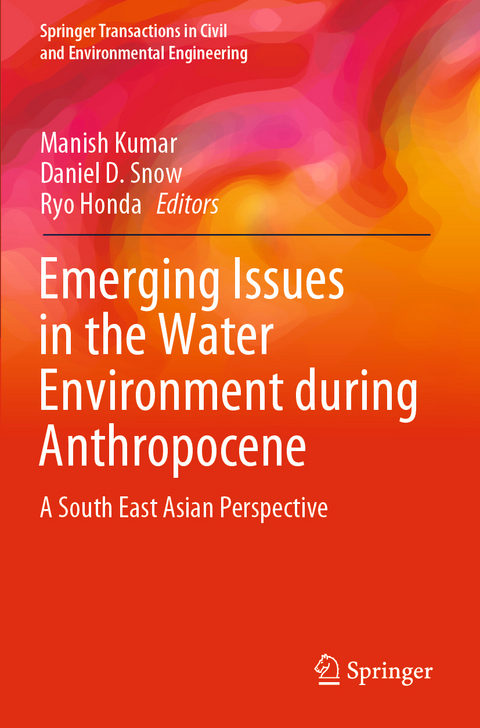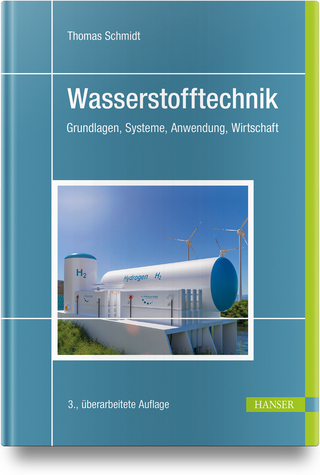
Emerging Issues in the Water Environment during Anthropocene
Springer Verlag, Singapore
978-981-329-773-9 (ISBN)
This book intends to bring together and integrate the subject matter of water quality. The book covers aspects of water related to climate change, emerging aspects of engineering sciences, bio-geochemical sciences, hydro geochemistry, river management and morphology, social sciences, and public policy. The book covers the role of disruptive innovations in water management, policy formation and impact mitigation strategies. The book includes lab results as well as case studies. It provides recommendations and solutions for policy making and sustainable water management. The chapters in this book deal cohesively with many aspects of the water environment during the Anthropocene era. The contents cover myriad issues, such as land degradation, water scarcity, urbanization, climate change, and disruptive innovation. The book also discusses issues highly pertinent to society and sustainability, such as the prevalence of enteric viruses and pharmaceutical residues as a possible anthropogenic markers in the aquatic environment. The book will prove useful for students, professionals, and researchers working on various aspects of water related concerns.
Dr. Manish Kumar is a faculty at Discipline of Earth Sciences, Indian Institute of Technology (IIT) Gandhinagar, Gujarat, India. He earned his Ph.D in Environmental Engineering from the University of Tokyo, Japan, and has received several prestigious awards and fellowship, such as Water Advanced Research and Innovation (WARI) Fellowship, Faculty Research Award, Best Research Award (IWA), Japan Society for the Promotion of Science (JSPS) foreign research fellowship, Brain Korea (BK)-21 post-doctoral fellowship, Monbukagakusho Scholarship, Linnaeus-Palme stipend from SIDA, Sweden, Research Fellowship from CSIR, India. Dr. Kumar is active in the fields of Hydrogeochemistry, Contaminant transport and modeling, Metal speciation, Isotope fingerprinting, Emerging contaminants and Water Management. He served as Principal Investigator (PI) for International Collaborative Projects funded by organizations like Asia Pacific Network, DST-JSPS, UKIERI etc. He is the associate editor of Groundwater for sustainable development (Elsevier) and Hydrological Research Letters and has more than sixty international journal publications and three edited books to his credit. Dr. Daniel D Snow is a research professor in the University of Nebraska School of Natural Resources, and director of the Nebraska Water Sciences Laboratory, a part of the Nebraska Water Center and Robert B. Daugherty Water for Food Institute. He has been a researcher at the University of Nebraska since 1990, and has co-authored over 100 articles on topics ranging from pesticide and antibiotic occurrence in surface and groundwater to uranium-series isotope geochemistry. His research focuses on the uses analytical chemistry to help understand how water becomes contaminated and what we can do to prevent it. A good part of his work in the Water Sciences Laboratory involves creating analytical methods for new or "emerging" environmental contaminants like steroids, pharmaceuticals, algal toxins, explosives and pesticides. In the year 2015, his team was awarded with Excellence in Environmental Engineering and Science Grand Prize by American Academy of Environmental Engineers and Scientists. Dr. Ryo Honda is a research associate professor in the faculty of geosciences and civil engineering, and an Adjunct professor of Research Center for Sustainable Energy and Technology of the Kanazawa University, Kanazawa, Japan. He has been associated with Kanazawa University since 2012. He was also associated with the University of Tokyo as project assistant professor during the period of 2005-2011. He was the long term editor of the Journal of Water Environment and Technology and a steering committee member of IWA Japan Young Water Professionals. Since 2016, he is actively engaged as an associate editor of nature partner journal-clean water. His field of interest includes but not limited to Environmental Process Engineering, Environmental Microbiology, Environmental and Energy Technology and Urban Engineering etc. He has been awarded with many accolades such as WET Excellent Paper Award from Japan Society of Water Environment, best poster award from 11th International Symposium on Southeast Asian Water Environment and many more. His research area focuses on environmental process engineering, environmental microbiology, and sustainability science. In addition to many international publications to his credit, he is also reviewing several international journals including Biotechnology and Bioengineering, Water Research, Bio resource Technology, Environmental Technology, Microbes and Environments, Biochemical Engineering Journal, Science of the Total Environment, Environmental Science and Pollution Research, etc.
Part I: Emerging Pollutants and Anthropocene.- Review on Occurrence and Toxicity of Pharmaceutical Contamination in Southeast Asia Water Resilience to Natural and Human Disasters.- Two Sides of a Coin: Targets and by-Products of Water and Wastewater Treatment Water Supply, Urbanization and Climate Change.- Water Quality Under the Changing Climatic Condition: A Review of the Indian Scenario.- A Review on Antibiotic Resistance Gene (ARG) in Wastewater Treatment Plant and ARG Detection In WWTP in Ishikawa, Japan and Colombo, Sri Lanka.- Part II: 2 Surface and Groundwater Quality Issues.- Nutrient Exchange at Water and Sediment Interface of the Largest Brackish Water Lagoon (Chilika), South Asia Analytics in Water Resource.- Determination of Anthropogenic Sources in the Groundwater Chemistry Along KT Boundary of South India.- Hydro Geochemical Investigation and Health Perspective of Arsenic in the Mid-Brahmaputra Floodplain of Assam, India.- Assessment of the Land-Use Pattern Changes and Its Impact on Groundwater Quality in Parts of the National Capital Region (NCR) Delhi, India.- Assessment of Water Quality Using Multivariate Analysis - A Case Study on the Brahmaputra River, Assam, India.- Geochemical Modelling of Groundwater Using Multivariate Normal Distribution (MND) Theory.- Part III: Remediation and Perception Issues.- Performance Appraisal of Filter-Based Sanitation System for Onsite Treatment of Domestic Wastewater.- Lake Eutrophication: Causes, Concerns and Remedial Measures.- Role of Phytoremediation Strategies In Removal of Heavy Metals.- Phytoremediation of Heavy Metals/Metalloids by Native Herbaceous Macrophytes of Wetlands: Current Research and Perspectives.- Part IV: Management Strategies Issues.- Water Management: Effects on Human Health and Nutrition.- Water Scarcity and Land Degradation Nexus in the Era of Anthropocene: Some Reformations to Encounter the Environmental Challenges for Advanced Water Management Systems Meeting the Sustainable Development.- Groundwater Contamination Issues in the Shallow Aquifer, Ramganga Sub-Basin, India.- Water Governance: A Pragmatic Debate Of 21st Century; An Indian Perspective.
| Erscheinungsdatum | 17.09.2020 |
|---|---|
| Reihe/Serie | Springer Transactions in Civil and Environmental Engineering |
| Zusatzinfo | 60 Illustrations, color; 25 Illustrations, black and white; XVII, 365 p. 85 illus., 60 illus. in color. |
| Verlagsort | Singapore |
| Sprache | englisch |
| Maße | 155 x 235 mm |
| Themenwelt | Naturwissenschaften ► Biologie ► Ökologie / Naturschutz |
| Naturwissenschaften ► Geowissenschaften ► Hydrologie / Ozeanografie | |
| Naturwissenschaften ► Geowissenschaften ► Meteorologie / Klimatologie | |
| Technik ► Bauwesen | |
| Technik ► Umwelttechnik / Biotechnologie | |
| ISBN-10 | 981-329-773-5 / 9813297735 |
| ISBN-13 | 978-981-329-773-9 / 9789813297739 |
| Zustand | Neuware |
| Informationen gemäß Produktsicherheitsverordnung (GPSR) | |
| Haben Sie eine Frage zum Produkt? |
aus dem Bereich


